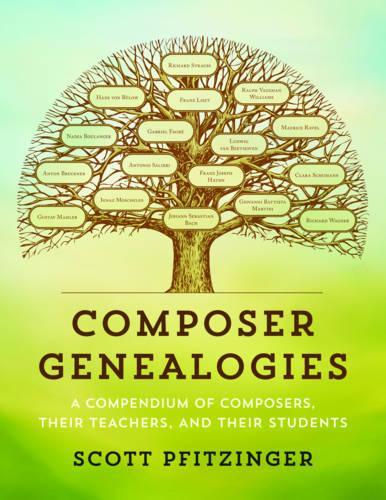
Composer Genealogies: A Compendium of Composers, Their Teachers, and Their Students
(Hardback)
Publishing Details
Composer Genealogies: A Compendium of Composers, Their Teachers, and Their Students
By (Author) Scott Pfitzinger
Bloomsbury Publishing PLC
Rowman & Littlefield Publishers
1st March 2017
United States
Classifications
Tertiary Education
Non Fiction
Composers and songwriters
Reference works
780.922
Winner of Choice Outstanding Academic Title 2017
Physical Properties
Hardback
628
Width 224mm, Height 292mm, Spine 38mm
1715g
Description
Throughout the western classical tradition, composers have influenced and been influenced by their students and teachers. Many musicians frequently add to their personal acclaim by naming their teachers and the lineage through which they were taught. Until now, the relationships between composers have remained uncataloged and understudied, but with enough research, it is possible to document entire schools of composition. Composer Genealogies: A Compendium of Composers, Their Teachers, and Their Students is the first volume to gather the genealogies of more than seventeen thousand classical composers in a single volume. Functioning as its own fully cross-referenced index, this volume lists composers and their dates, followed by their teachers and notable students. A short introduction presents the parameters by which composers were selected and provides a survey of the literature available for further study. Gathering records and information from reference books, university websites, obituaries, articles, composers websites, and even direct contact with some composers, Pfitzinger creates a valuable resource for music researchers, composers, and performers.
Reviews
This unique reference tool by Pfitzinger (Univ. of WisconsinLa Crosse) consists entirely of an alphabetical list of more than 17,300 composers' teachers and notable students, giving dates and country of origin (and for some, primary countries of association). The entry for American composer John Knowles Paine (18391906), for example, lists three teachers and 16 students; one can readily discover here that his teachers were German and his students mostly Americansome of whom achieved modest renown. Other composers' entries show more teachers and, in many cases, dozens more students; those for Aaron Copland and Howard Hanson feature extensive listings of students. These social network and genealogical connections are important insofar as they trace the special influence composers can have on their students through time. Coverage is limited to composers of classical works (or in some cases, stretching the definition to include "cross-over" composers such as Herbie Hancock). Some known primarily for their stature in performance rather than composition also appear in these pages. The internationally known Austrian pianist Artur Schnabel (18841951), for instance, is shown to have had two teachers and no fewer than 20 students in composition, some of whom were also performers. An essential addition for all libraries maintaining comprehensive music collections. Summing Up: Essential. Undergraduates through professionals/practitioners; general readers. * CHOICE *
Scott Pfitzingers massive book is a thoroughly surprising release, not least because it seems as if such an encyclopaedic examination of teachers and followers in Western art music should have been produced long ago.... Pfitzingers book...is an invaluable resource for anyone curious of the rawest data of Western art music history. * Tempo *
This large volume documents the genealogies or pedigrees of musical composers from the 18th century to the present. One of the ways that musicians establish credibility and public interest in their music is through the teachers under whom they studied, as well as those teachers under whom their teachers studied. The author of this book has documented, as much as possible, the genealogies of musical composers who have taught other composers; it thus does not try to be comprehensive regarding other musical disciplines or instruments and their pedigrees. Just focusing on musical composers has produced a book of over 600 pages. The entries are listed alphabetically, starting with the composer's name and dates, the primary countries where they lived, their teachers, and their notable students. The book serves as an index with comprehensive cross-referencing. One can follow a composer's musical pedigree both backwards through their teachers and forwards through their students, so this volume is a fantastic quick reference source for learning who influenced whom in the musical composition world in the last 350 years. * American Reference Books Annual *
What a marvelous resource! With Scott Pfitzinger's excellent work, research that once took weeks can now be accomplished in a couple of hours or less. Researchers can easily trace with whom a particular composer has studied and make connections as to why a stylistic shift occurred in their music. -- Frank Felice, Ph.D, associate professor of composition and electronic music, Butler University
This book will be a joy for any readers interested in genealogy or family trees. It's wonderful to trace the various threads of influence and development throughout the centuries. -- Elliott Schwartz, composer and author
Author Bio
Scott Pfitzinger holds an MM in music composition from Butler University, an MLS in library science from Indiana University, and a Ph.D. (ABD) in education from Capella University. He is a composer and educator himself and currently serves as the access services librarian at the University of Wisconsin - La Crosse.
